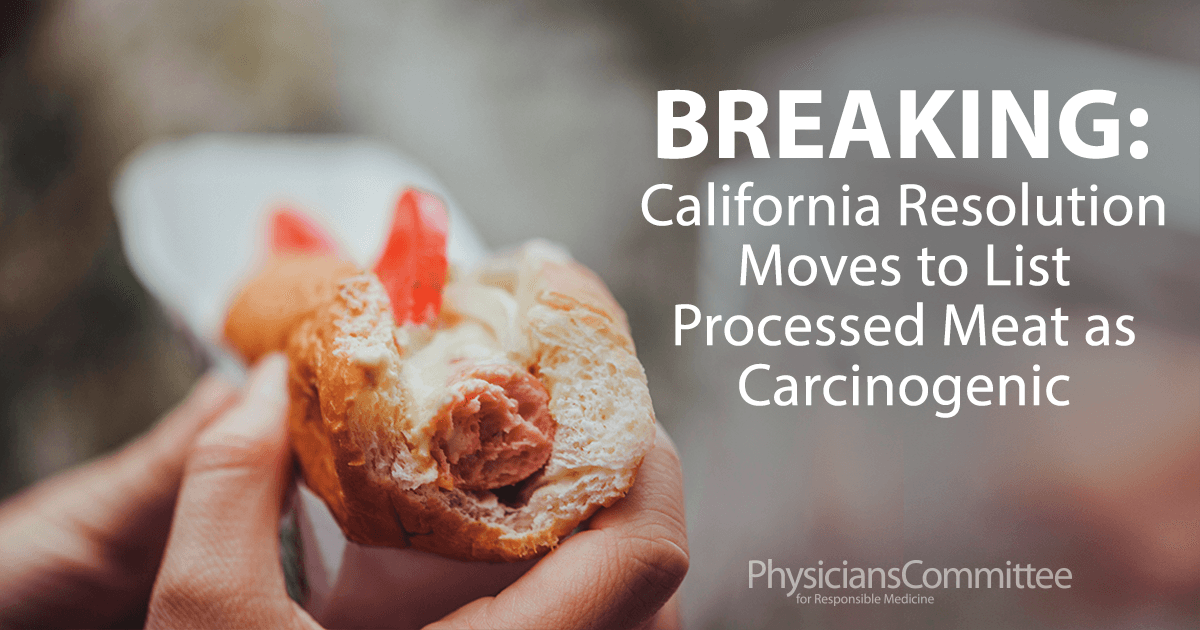Resolution Urges OEHHA to Add Cancer-Causing Processed Meat to Prop 65
Resolution Backed by the Physicians Committee for Responsible Medicine and Social Compassion in Legislation

SACRAMENTO—SCR 100, a resolution introduced in the California State Legislature by Sen. Ricardo Lara (D-Bell Gardens), urges the Office of Environmental Health Hazard Assessment (OEHHA) to add processed meat—such as hot dogs, bacon, and deli meat—to California’s list of substances known to cause cancer, as required under Proposition 65. The bill is backed by the Physicians Committee for Responsible Medicine and Social Compassion in Legislation.
A 2015 World Health Organization report classified processed meat—including pepperoni, ham, and sausage made from pork, beef, or poultry—as a Group 1 carcinogen. The authors highlighted a meta-analysis that concluded that each 50-gram portion of processed meat eaten daily increases the risk of colorectal cancer by 18 percent. Studies show that processed meat also increases the risk of breast and pancreatic cancer.
SCR 100 would urge the OEHHA to comply with Proposition 65 and warn individuals of their potential exposure to this harmful substance by amending California Code of Regulations, title 27, section 27001(b) to add “processed meat (consumption of)” to the list of “chemicals known to the state to cause cancer.”
“At one point in time, people smoked cigarettes without giving it a second thought or considering the health risks involved, because they were completely unaware of the risks,” says Judie Mancuso, founder and president of Social Compassion in Legislation. “Many people around the world still smoke today, but at least they do knowing the potential risks involved and many don’t or have cut back because of their awareness of the potential to develop lung cancer. That is all we are asking for—people have a right to know the risks involved in consuming processed meat, which has the potential to cause colon cancer in the long run.”
Chemicals are added to or removed from the official list based on California's analysis of current scientific information, and the list is to include, at a minimum, “substances” referred to by Labor Code sections 6382(b)(1) or 6382(d), the former of which identifies by reference chemicals or substances listed by the International Agency for Research on Cancer (IARC). In 2015, IARC classified consumption of processed meat as “carcinogenic to humans” (Group 1) on the basis of sufficient evidence for colorectal cancer after assessing more than 800 epidemiological studies.
Companies that sell products associated with these listed substances, either in combination with unlisted substances or alone, in California must provide “clear and reasonable” warnings on the label to inform consumers about the risk.
There is a regulatory process that allows producers of processed meat and the public to weigh-in on the issue before it is formally added to the list, but OEHHA has not started this process in accordance with existing law.
“SCR 100 would warn Californians about the clear-cut cancer risk of consuming cold cuts and other processed meat,” says Susan Levin, M.S., R.D., director of nutrition education for the Physicians Committee for Responsible Medicine.
Colorectal cancer is the second-leading cause of cancer-related deaths in California.
Media Contact
Jeanne Stuart McVey
202-527-7316
jmcvey[at]pcrm.org
Founded in 1985, the Physicians Committee for Responsible Medicine is a nonprofit organization that promotes preventive medicine, conducts clinical research, and encourages higher standards for ethics and effectiveness in education and research.








